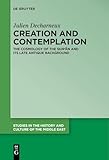Creation and Contemplation : The Cosmology of the Qur'ān and Its Late Antique Background / Julien Decharneux.
Material type: TextSeries: Studies in the History and Culture of the Middle East ; 47Publisher: Berlin ; Boston : De Gruyter, [2023]Copyright date: ©2023Description: 1 online resource (IX, 288 p.)Content type:
TextSeries: Studies in the History and Culture of the Middle East ; 47Publisher: Berlin ; Boston : De Gruyter, [2023]Copyright date: ©2023Description: 1 online resource (IX, 288 p.)Content type: - 9783110794014
- 9783110794168
- 9783110794083
- 297.242 23/eng/20231120
- online - DeGruyter
- Issued also in print.
| Item type | Current library | Call number | URL | Status | Notes | Barcode | |
|---|---|---|---|---|---|---|---|
 eBook
eBook
|
Biblioteca "Angelicum" Pont. Univ. S.Tommaso d'Aquino Nuvola online | online - DeGruyter (Browse shelf(Opens below)) | Online access | Not for loan (Accesso limitato) | Accesso per gli utenti autorizzati / Access for authorized users | (dgr)9783110794083 |
Browsing Biblioteca "Angelicum" Pont. Univ. S.Tommaso d'Aquino shelves, Shelving location: Nuvola online Close shelf browser (Hides shelf browser)
Frontmatter -- Acknowledgments -- Contents -- General Introduction -- Chapter 1. Natural Theology -- Chapter 2. Contemplation: Between Theory and Practice -- Chapter 3. Doctrine of Creation -- Chapter 4. Divine Economy and Continuous Creation -- Chapter 5. On the Creation of the Heavens -- Chapter 6. On the Creation of Angels and Men -- General Conclusion -- Bibliography -- Indexes
restricted access online access with authorization star
http://purl.org/coar/access_right/c_16ec
In Creation and Contemplation, Julien Decharneux explores the connections between the cosmology of the Qur’ān and various cosmological traditions of Late Antiquity, with a focus on Syriac Christianity. The first part of the book studies how, in exhorting its audience to contemplate the world, the Qur’ān carries on a tradition of natural contemplation that had developed throughout Late Antiquity in the Christian world. In this regard, the analysis suggests particularly striking connections with the mystical and ascetic literature of the Church of the East, which was in effervescence at the time of the emergence of Islam. The second part argues that the Qur’ānic cosmological discourse is built so as to serve the overarching theological message of the text, namely God’s absolute unity. Despite the allusive, and sometimes obscure, way in which the Qur’ān talks about the world’s coming into being and its maintenance in existence, the text betrays its authors’ acquaintance with cosmological debates of Late Antiquity. In studying the Qur’ān through the prism of Late Antiquity, this book contributes to our understanding of the emergence of Islam and its relationship with other religious traditions of the time. Winner of the 2022 Marie-Antoinette Van Huele Prize and the 2023 Richard Kreglinger Prize (both Faculty of Philosophy and Social Sciences, Free University of Brussels.
Issued also in print.
Mode of access: Internet via World Wide Web.
In English.
Description based on online resource; title from PDF title page (publisher's Web site, viewed 06. Mrz 2024)









